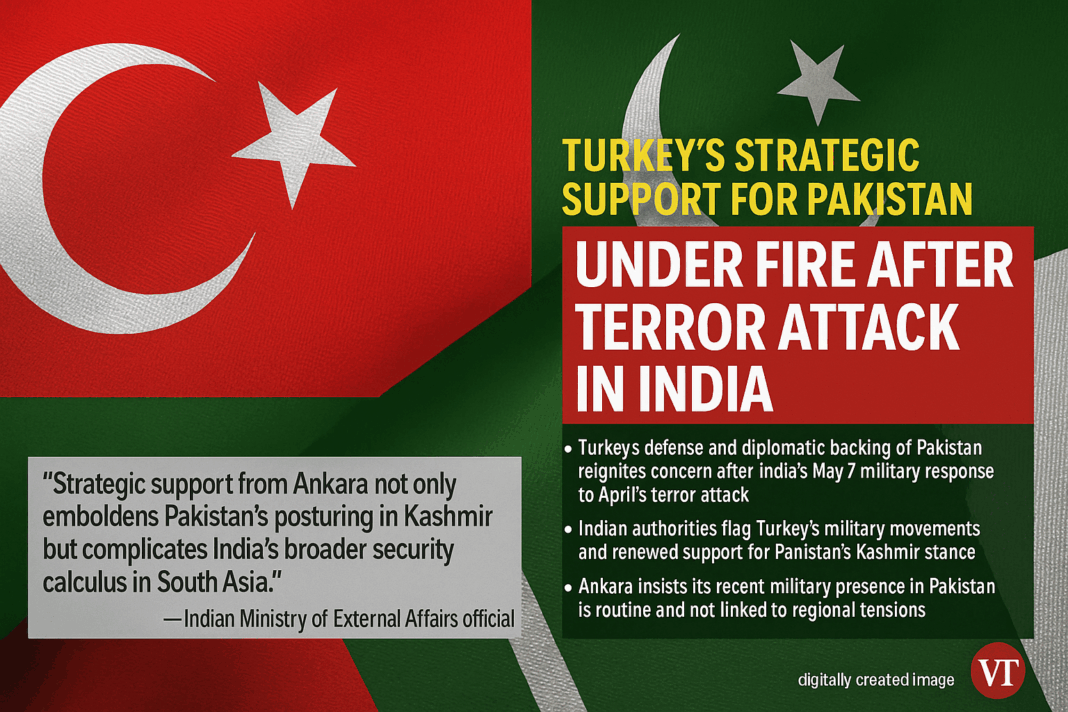KEY POINTS
- Turkey’s defense and diplomatic backing of Pakistan reignites concern after India’s May 7 military response to April’s terror attack.
- Indian authorities flag Turkey’s military movements and renewed support for Pakistan’s Kashmir stance.
- Ankara insists its recent military presence in Pakistan is routine and not linked to regional tensions.
- India revokes Turkish company clearances amid rising South Asian geopolitical tensions.
New Delhi/Istanbul – May 15, 2025 | Virginia Times
Tensions in South Asia are escalating as Turkey’s deepening defense and diplomatic ties with Pakistan come under renewed international scrutiny. The spotlight follows a recent string of events, including the April 22 Pahalgam terror attack in India and Turkey’s high-level support for Islamabad amid rising regional unrest.
India has expressed serious concern over Ankara’s growing alignment with Islamabad—particularly in the areas of military cooperation and its longstanding position on Kashmir—as the geopolitical stakes intensify in the subcontinent.
Historic Ties, Strategic Alignment
Turkey and Pakistan share a seven-decade-long partnership, with Ankara being one of the first to recognize Pakistan’s independence in 1947. These ties, rooted in Islamic solidarity and shared ideological stances, have evolved into a robust strategic alliance, especially under President Recep Tayyip Erdogan.
Erdogan has vocally advocated for a UN-led plebiscite in Kashmir, a sentiment India strongly rejects. In a show of reciprocal alignment, Pakistan continues to deny the Armenian genocide, echoing Ankara’s own contentious stance.
Defense Ties and Military Movements
Turkey now stands as Pakistan’s second-largest arms supplier, trailing only China. Its contributions include Bayraktar TB2 drones, Songar combat UAVs, and MILGEM-class naval vessels. A $1.5 billion defense agreement in 2018 further accelerated the modernization of Pakistan’s naval power.
In the wake of the April 22 attack, a Turkish warship (TCG Buyukada) docked in Karachi on May 5, and a Turkish C-130 Hercules aircraft landed in Pakistan on April 27. Though Turkish officials maintain these were “scheduled, non-combat operations,” Indian media has framed them as suspicious in the current volatile context.
— Indian Ministry of External Affairs official (via Virginia Times)
Diplomatic Friction Following Operation Sindoor
India launched Operation Sindoor on May 7, a precision military response aimed at eliminating terror camps in Pakistan-occupied Kashmir. In its aftermath, Erdogan reached out to PM Shehbaz Sharif, reaffirming Turkish support and urging for an international probe into the terror attack—a move New Delhi condemned as interference.
India has since revoked clearances for Turkish defense firms and is reportedly re-evaluating trade agreements with Ankara, signaling a serious diplomatic shift.
Geopolitical Repercussions and Outlook
With Turkey stepping into a more assertive role in South Asia, the India-Turkey relationship is facing its most challenging period in decades. Analysts warn that Ankara’s firm position on Kashmir could polarize regional dynamics even further and strain its diplomatic leverage with New Delhi.
As India counters with tighter economic restrictions and strategic realignments, the evolving Turkey-Pakistan axis may redefine power balances not just in South Asia—but across Eurasia.
CONTINUE NEWS COVERAGE
Stay with Virginia Times as we follow diplomatic developments, defense pacts, and regional alliances impacting South Asia’s security outlook.
A global media for the latest news, entertainment, music fashion, and more.














